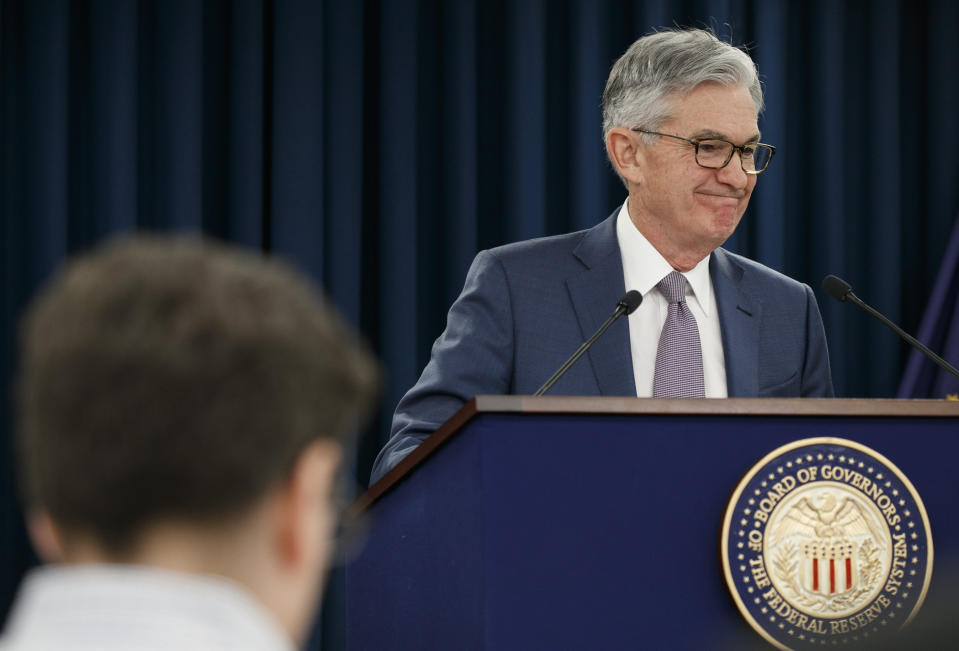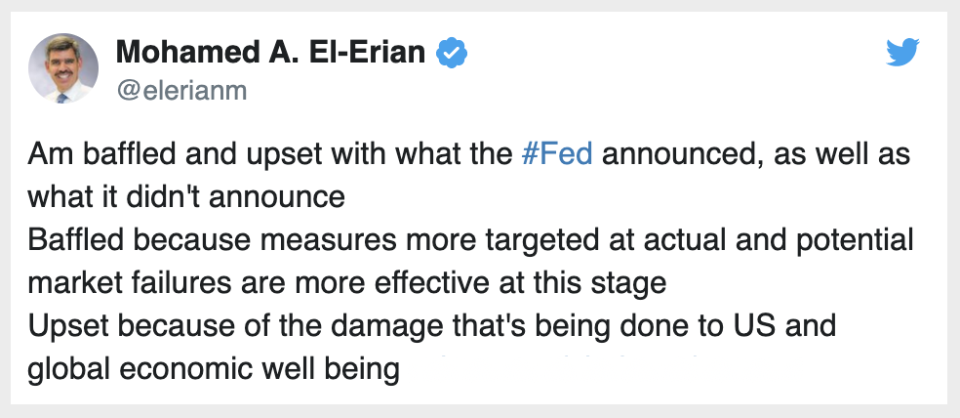The Federal Reserve takes its crisis management game up several notches: El-Erian
Having complained on Sunday about the Federal Reserve’s emergency policy response, I would like to be among the first to commend the central bank on the measures it took Wednesday. By significantly expanding the use of what I have previously referred to as laser-focus measures, it is better placed to counter tensions in the financial system that that could cause widespread market failures and severely worsen the sharp recession that the global economy is now on track for.
Following Sunday’s series of emergency policy announcements, I tweeted (below) that I was “baffled and upset with what the Fed announced, as well as what it did not announce. Baffled because measures more targeted at actual and potential market failures are more effective at this stage. Upset because of the damage that’s being done to the US global economic wellbeing.” I had detailed why earlier in this Bloomberg Opinion article providing an immediate reaction to the announcements. I reiterated my worries on television the next day.
My worry was not about asset prices but, rather, about the urgent need to counter threats to the normal functioning of markets. They centered on the aggressive use of the general interest rate tool (namely, the 100 basis point interest rate cut that followed a 50 bps reduction only days earlier and brought rates down essentially to zero) and on the insufficient use of more targeted measures.
The concern was driven by (i) evidence from the week before of spreading market stress, including that Monday in the credit and inflation segments and spreading to the US Treasuries on Thursday, the most important one of all; (ii) prior US and worldwide experiences demonstrating how financial market failures contaminate economic activity and can easily bring even a healthy the economy down to its knees; (iii) the role that US financial markets play in the global economy, and the benefits that we derive from that; and (iv) the good example that was set only days earlier before by the Bank of England on what to do and how.
I was also worried that the aggressive cuts were using valuable and scarce policy ammunition at a time when lower rates would have no effect in countering the economic contraction. Remember, because of the spread of the coronavirus, the economy is being hit by sudden stops that have reached critical mass globally, are multiplicative in the worst manner, are being turbocharged by the economic impact of uncertainty and fear and, importantly, are resistant at this stage to general policy stimulus.
Some analysts, predominantly on Wall Street, disagreed with my assessment. Others were mixed, noting that the massive interest rate cut was “necessary but not sufficient.” By contrast, the market gave the emergency intervention a big thumbs down, reinforcing the view it had expressed the prior week on the 50 basis point cut. On Monday, the major US stock indices fell by 12-13%, fueled also by a barrage of negative news on the global spread of the coronavirus.

Today marks an important and highly welcomed evolution in the Fed’s emergency policy response through the implementation of two much more targeted measures and the reinforcement of a third one.
Working with the US Treasury under 13(3) authority, the Fed activated two emergency financing windows: one for commercial paper funding (crucial for both companies and money market funds) and the other for primary dealers. It also announced that it would now hold two daily repo operations (not just one) for a total amount of $1 trillion (double the prior amount).
By so acting, and by being open to adapt them as needed, the Fed took up its crisis management game several notches. For that it should be strongly commended. What remains now is to address at least one more major challenge to the functioning of financial markets – that is, minimizing the risk of massive disruption to the municipal market and to the flow of credit to otherwise solvent companies that, now facing temporary liquidity pressures, could too easily be tipped into insolvency. For that, the Fed will need to ride shot gun with the Treasury and other government agencies, potentially playing more the role of program administrator than main source of funding.
Dr. Mohamed A. El-Erian is the Chief Economic Advisor of Allianz and President-Elect of Queens’ College Cambridge. The author of two New York Times bestsellers, he is a senior advisor to Gramercy, professor of practice at the Wharton School (University of Pennsylvania) and senior global fellow of the Lauder Institute.
-
Follow Yahoo Finance on Twitter, Facebook, Instagram, Flipboard, LinkedIn, and reddit.
Find live stock market quotes and the latest business and finance news
For tutorials and information on investing and trading stocks, check out Cashay

 Yahoo Finance
Yahoo Finance 

